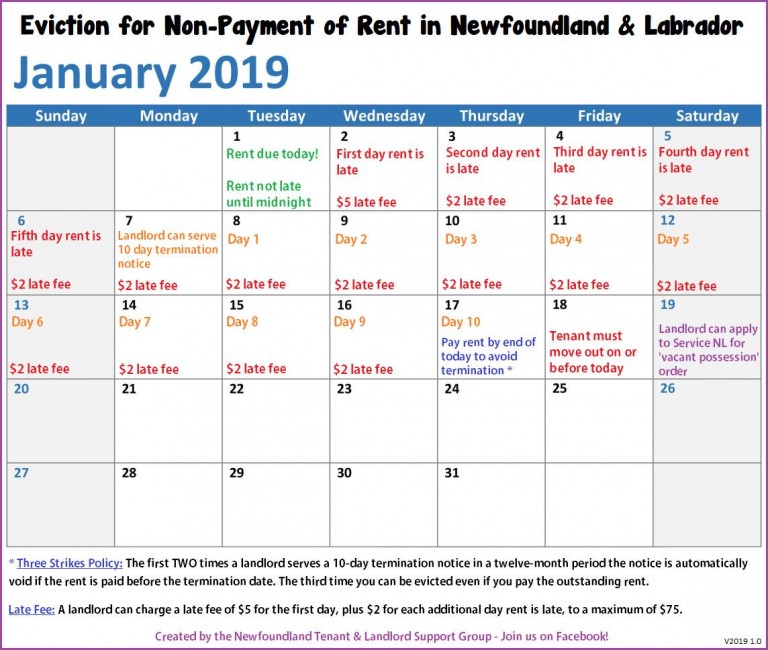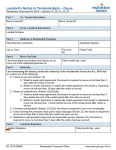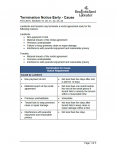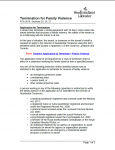The amount of noticed that is required to terminate a rental agreement is different depending on the reason for the termination and the type of rental agreement.
Standard Termination (No Reason Termination)
Where the residential premises are rented from week to week the tenant is required to give at least seven days notice to terminate the rental agreement, and the landlord is required to give at least four weeks notice.
Where the residential premises are rented from month to month the tenant is required to give at least one month notice to terminate the rental agreement, and the landlord is required to give at least three months notice.
Where the residential premises are rented for a fixed term the tenant is required to give at least two months notice, and the landlord is required to give at least three months notice, if the rental agreement is being terminated ONCE IT EXPIRES. It is important to note that a standard termination notice cannot be used to end a fixed-term rental agreement early. Standard termination notices are only used during a fixed-term rental agreement to indicate that the landlord or tenant is terminating the rental agreement once it expires and comes to an end.
All termination notices MUST be in writing. The notice must be signed by the party serving the notice or the estate administrator, list the address of the rental unit, be served before the day rent is normally due, and state the date on which the rental agreement terminates and the tenants will vacate the rental unit, which must be the last day of a rental period.
Notice for health-related reasons
Notices served for health-related reasons must be served in accordance with the normal rules for serving notices, which can be found in our Help Topic called Serving Notices.
Where a tenant has their income reduced due to an illness the tenant, or other tenants in the rental unit, may terminate the rental agreement by providing one month notice to the landlord, along with evidence of the tenant’s reduced income.
Where a person who has been providing financial assistance towards the payment of a tenant’s rent is no longer able to provide financial assistance the tenant due to ill health the tenant, or other tenants in the rental unit, may terminate the rental agreement by providing one month notice to the landlord, along with evidence of the ill health of the person providing assistance. A common situation in which this may arise is if a parent is helping to pay the rent of a student. Should the parent become ill, and no longer be able to provide financial assistance to the student, the tenant may terminate the rental agreement.
If a tenant has an ill family member and decides to move in with the ill family member to help care for them the tenant, or other tenants in the rental unit, may terminate the rental agreement by providing one month notice to the landlord, along with evidence of the ill health of the family member.
Where a tenant is admitted into a home that provides care for the aged as a permanent resident the tenant, or other tenants in the rental unit, may terminate the rental agreement by providing one month notice to the landlord, along with evidence of the tenant’s admission into the home or other facility.
Where a tenant dies the administrator of the estate of the tenant, or other tenants in the rental unit, may terminate the rental agreement by providing one month notice to the landlord, along with evidence of the tenant’s death.
All termination notices served for health-related reasons MUST be in writing and include supporting documentation. The notice must be signed by the tenant or the estate administrator serving the notice, list the address of the rental unit, be served before the day rent is normally due, and state the date on which the rental agreement terminates and the tenants will vacate the rental unit which must be the last day of a rental period. Notices served for health-related reasons must be served in accordance with the normal rules for serving notices which can be found in our Help Topic called Serving Notices.
Notice where failure to pay rent
It is important that rent is paid on time. If for some reason you are unable to pay rent on time you should notify your landlord to make them aware of the situation and work out an arrangement to get caught up on rent payments.
In cases where rent is not paid the law does provide a grace period before a landlord can serve a termination notice. Termination notices MUST always be in writing.
When rent is late the landlord can charge a late fee of $5 for the first day rent is late, and $2 for each additional day, to a maximum of $75.
If the rental unit is rented month to month, or for a fixed term, the landlord can serve a termination notice once rent has been late for a full five days. The landlord must give the tenant at least ten days written notice that the rental agreement is being terminated.
If the rental unit is rented on a weekly basis the landlord can serve a termination notice once rent has been late for a full three days. The landlord must give the tenant at least three days written notice that the rental agreement is being terminated.
It is important to know that rent is not considered “late” until the day AFTER it is due. If rent is due on the first day of each month, it’s not considered late until the second day of the month. When counting the number of days that rent is late you would start counting on the day after it was due. It’s also important to note that a notice cannot be served until the FULL grace period has gone by. Notice cannot be issued until after the full five days has gone by for a fixed-term or monthly rental, or three days for a weekly rental. For example, if rent is due on the first day of the month it would be considered “late” on the second. The last day of the five-day grace period would be the sixth day of the month, which means a termination could be served on the seventh.
Even if a termination notice has been served, if the tenant pays their rent in full (including any late fees) before the termination date the termination notice is automatically considered null and void, and it cannot be enforced by the landlord. However, this can only happen twice in a twelve-month period. The third time a termination notice is served for non-payment of rent the tenant can be evicted even if rent is paid in full by the termination date. The twelve-month period used for this purpose would be the previous twelve months and not based on an actual calendar year.
For example, if a tenant were to receive termination notices for non-payment of rent in October, December, and February they could be evicted because they were all received within twelve months, even though the notice in February would have been received in a new calendar year.
Essentially, it’s a “three-strike rule”. The first two times you receive a termination notice for non-payment of rent you can simply pay rent to avoid eviction, but on the third strike you’re out!
Notice where material breach of agreement
A material breach occurs when either the landlord or the tenant fails to uphold a major part of the rental agreement. The breach must be so substantial that it prevents the rental agreement from being carried out or defeats the purpose of the agreement. In these cases, the non-breaching party is no longer obligated to carry out their own obligations under the agreement. Effort must be made to resolve issues, where possible, before terminating the rental agreement.
If a landlord commits a material breach of the rental agreement the tenant must notify the landlord of the breach in writing and allow the landlord a “reasonable” amount of time to correct the problem. What is considered “reasonable” depends on the situation. If the landlord fails to correct the problem after being notified the tenant may terminate the rental agreement. The tenant must give the landlord at least one month notice that the rental agreement is being terminated if the rental unit is being rented month to month, or for a fixed term. If the rental unit is being rented on a weekly basis the tenant must give the landlord one week notice. Notice MUST be in writing and served before the day rent is due.
If a tenant commits a material breach of the rental agreement the landlord must notify the tenant of the breach in writing and allow the tenant a “reasonable” amount of time to correct the problem. What is considered “reasonable” depends on the situation. If the tenant fails to correct the problem after being notified the landlord may terminate the rental agreement. The landlord must give the tenant at least one month notice that the rental agreement is being terminated if the rental unit is being rented month to month, or for a fixed term. If the rental unit is being rented on a weekly basis the landlord must give the tenant one week notice. Notice MUST be in writing and served before the day rent is due.
Notice when premises uninhabitable
If a rental unit is no longer fit for habitation a landlord or tenant can terminate the rental agreement immediately. Notice MUST be in writing. No advance notice is required.
A rental unit can be made uninhabitable either due to lack of maintenance by the landlord, damage caused by the tenant, or an unforeseeable situation like a flood or fire. In most cases a residential premises can only be deemed uninhabitable by an “authority” such as a health or building inspector.
Notice where tenant’s obligation not met
If a tenant fails to keep a rental premises clean or fails to repair damage they have caused, that their guests have caused, or that was caused through the tenant’s neglect the landlord may serve the tenant with a written notice that the premises must be cleaned up and damages repaired.
If the tenant fails to comply with the request within three days after receiving the notice, or within a reasonable time in the circumstances, the landlord may terminate the rental agreement. The landlord must give the tenants at least five days written notice that the rental agreement is being terminated.
Notice where landlord contravenes peaceful enjoyment or reasonable privacy
If a landlord is interfering with the peaceful enjoyment or reasonable privacy of a tenant, the tenant may provide written notice to the landlord that the rental agreement is being terminated. The tenant must move out of the rental unit between five and fourteen days after providing notice to the landlord. The termination notice MUST be in writing and state the date that the tenant plans to vacate the rental unit. You can find more information in our Help Topic called Peaceful Enjoyment & Reasonable Privacy.
Notice when tenant contravenes peaceful enjoyment or reasonable privacy
If a tenant is interfering with the peaceful enjoyment or reasonable privacy of the landlord, or other tenants in the same residential complex, the landlord may terminate the rental agreement. The landlord must give the tenants at least five days notice that the rental agreement is being terminated. The termination notice MUST be in writing and state the date that the tenant is required to vacate the rental unit. You can find more information in our Help Topic called Peaceful Enjoyment & Reasonable Privacy.
Notice where tenant is victim of family violence
If the safety of a tenant or their children is at risk because of family violence the tenant may apply to Service NL for permission to terminate their rental agreement early if they need to leave the abusive situation. This only applies to a fixed-term rental agreement.
To terminate a rental agreement for this reason the tenant must apply to Service NL for a certificate first and give the landlord a copy of the certificate with the termination notice. The tenant must provide the landlord with at least thirty days notice that the rental agreement is being terminated. The notice MUST be in writing and state the date the tenant plans to vacate the rental premises.
Before a certificate to terminate the rental agreement will be granted the tenant must provide ONE of the following, along with their application, to the Director of Residential Tenancies:
Court Order
If the tenant already has any of the following court documents, they may file with Service NL for permission to terminate their rental agreement without requiring any further documentation:
- a copy of an emergency protection order granted under the Family Violence Protection Act
- a restraining order
- a peace bond or other court order that is in place to prevent a person who is alleged to have committed family violence against the tenant or a child residing with the tenant from contacting or communicating with the tenant
Statement of Professional
If the tenant does not have a court order they will require a statement from one of the following, acting in his or her professional capacity, indicating his or her opinion that the tenant or a child residing with the tenant has been the subject of family violence:
- a medical practitioner, registered nurse or nurse practitioner, practical nurse, social worker, psychologist
- a member of the Royal Newfoundland Constabulary or the Royal Canadian Mounted Police
- an individual employed by an agency or organization to assist individuals for whom the agency or organization provides accommodation in an emergency or transitional shelter because of violence or abuse
The Director of Residential Tenancies has five business days after receiving an application to either issue a certificate or deny the application. A decision by the Director is final and not subject to review or appeal. If an application is denied the tenant can apply again if the circumstances change.
A certificate issued by the Director for this reason is only valid for ninety days after it is issued. Once ninety days has passed the tenant would need to apply again for a new certificate.
A landlord must ensure that any information received in connection with a notice or certificate provided as a result of family violence is kept confidential.
If a tenant terminates a rental agreement for reasons relating to family violence the rental agreement is terminated for all tenants under the rental agreement and the landlord must notify the other tenants that the rental agreement is being terminated. If the landlord and remaining tenants agree, they may enter into a new rental agreement for the other tenants to remain in the rental unit. The original tenant that is terminating their rental agreement for reasons relating to family violence is only responsible for paying the rent up until the date specified in the termination notice.
Group terminations
If a residential complex has more than nine residential premises or a mobile home park has more than five residential premises special rules apply regarding group terminations.
Within a three-month period, a landlord cannot give a notice of termination or refuse to renew rental agreements that relate to 50% of more of the residential premises in the residential complex unless the landlord requires possession of the residential premises to:
- Demolish the residential premises
- Change the use of the residential premises to something other than a residential premises
- Make repairs or renovations to the residential premises that are so extensive that that residential premises is required to be vacant
In these cases, the landlord must first obtain the necessary permits or permission from the appropriate authorities to complete the work and must provide the tenants with at least six months notice that the rental agreement is being terminated. If a landlord provides a termination notice for this reason the tenant can terminate the rental agreement earlier by providing the landlord with at least ten days notice and is only required to pay rent up until the termination date. Termination notices MUST always be in writing and state the date that the tenant plans to, or is required to, vacate the rental unit.
The rules regarding group terminations do not apply if the terminations are for reasons relating to the non-payment of rent, a material breach of the agreement, the tenant failing to meet their statutory obligations after being properly notified, or where the tenant interferes with the peaceful enjoyment or reasonable privacy of the landlord or other tenants in the residential complex.
In cases where a six month notice period would cause undue hardship on the landlord or the tenant an application can be made to Service NL to extend or reduce the notice period.
If the landlord fails to carry out the work that was identified as the reason for the group termination and the landlord enters into new rental agreements with new tenants, the landlord is prohibited from charging more for rent than was previously being charged prior to the group termination.
If a tenant resides in a rental unit for at least five conservative years and the landlord converts the unit into a condominium unit they must give the existing tenant the “right of first refusal” if an acceptable offer to purchase the condominium unit is received. This means that if an offer to purchase the unit is received by the landlord the existing tenant would be given seventy-two hours to purchase the unit at the same price and terms as contained in the offer to purchase received by the landlord. If the existing tenant declines the offer to purchase, the landlord is free to sell the unit to another buyer. This does not apply if the offer to purchase that is received by the landlord is an offer to purchase more than one unit.
Termination for invalid purpose
A landlord cannot terminate a rental agreement, or threaten, intimidate, or harass a tenant or a member of the tenant’s family because the tenant has filed a complaint regarding their residential premises.
If a tenant receives a termination notice from their landlord as a result of filing a complaint about their residential premises the tenant can apply to Service NL for an order declaring the termination notice void. The application must be made within one month after receiving the termination notice from the landlord.
Disconnection of services / Changing of locks / Vacant possession order
In cases where a termination notice has been served and the tenant refuses to leave the rental unit the landlord must apply for a “vacant possession order” from Service NL prior to changing the locks.
A vacant possession order can be taken to the Sheriff’s Office for enforcement. A Sheriff’s Officer will escort the landlord to the property, remove the tenant if necessary, and allow the landlord to change the locks. This is the only legal way locks on a rental unit can be changed if a tenant refuses to leave after being served a legal termination notice.
It is also a contravention of the Residential Tenancies Act to disconnect heat, water, or electrical service until you receive a vacant possession order from Service NL, and have it enforced by the Sheriff’s Office. More information on enforcement is available in our Help Topic called Enforcing Service NL Orders (coming soon).












